The first commemoration ceremony for oral history narrators held
An oral history group should exist beside every great plan
Maryam Rajabi
Translated by M. B. Khoshnevisan
2018-3-14
According to the website of Iranian Oral History, on the occasion of the eightieth anniversary of the foundation of the National Library of Iran, the first ceremony for commemoration of oral history narrators was held by the Research Center of the National Library and Archives of Islamic Republic of Iran on Tuesday 27th of February 2018. Four books entitled “Memoires and Perils” which includes an oral history interview with Dr. Kamal Kharrazi, and has been researched and compiled by Hourieh Saeedi, “Bright Star” which includes an oral history interview with Noushafarin Ansari, and has been researched and compiled by Peimaneh Salehi, “Dedicated to Children” which includes an oral history interview with Soraya Qezel Ayaq and has been researched and compiled by Peimaneh Salehi and “Justice and Politics” which includes an oral history interview with Ahmad Sadr Haj Seyed Javadi, and has been researched and compiled by Qorbanali Kenar Roudi were unveiled in the ceremony. Also, in view of more than a thousand interviews conducted in the National Library, some of the people interviewed were appreciated for their collaboration; they include Professor Ahmad Samiee Gilani, the prominent member of the Academy of Persian Language and Literature, translator and editor, the Faculty Member of Encyclopedia of Islamic World, and the author of lasting works in the field of writing, professor Mohsen Mohseni, master of carpet industry and designing, the Deputy Head of Iran Carpet Company, university professor and author, Dr. Kamal Kharazi, former Iranian Foreign Minister, Dr. Nasrollah Pour Javadi, Professor of Philosophy, a member of Academy of Persian Language and Literature and the Center for Great Islamic Encyclopedia, the founder and manager of the Center for University Publication and the owner of numerous work in the area of mysticism and philosophy, Seyed Hasan Arefi, the Minister of Culture and Higher Education in the government of martyr Mohammad Ali Rajaee, the Dean of Tehran University after the victory of Islamic Revolution, Dr. Iraj Fazel, former Minister of Culture and Higher Education, former Minister of Health and Medical Treatment and Education, the member of the Supreme Council of Islamic Revolution and the physician of the late Imam Khomeini (God bless his soul) and the Supreme Leader, the professor of Shahid Beheshti Medical Sciences, Noushafarin Ansari, university professor, author, researcher and the Secretary of the Council of Children Book, Morteza Haji, former Minister of Education, Engineer Ahmad Al-e Yasin, the executive member and guide of Karun Sugar Cane Industry and Planting Company, Pilot Mohammad Ansari, former Commander of Islamic Republic of Iran Army Aviation, Dr. Eqbal Qassemi Pouya, author and researcher in Education Ministry and university professor, Hasan Kharat Taherdel, a senior manager of Bank Mellat, lecturer and researcher in the fields of psychology and management, Dr. Mahmoud Bazargan, a political prisoner under the Second Pahlavi, a freed POW during the Scared Defense and university professor and the comrade of martyr Mohammad Ali Jahan Arar and Dr. Taqi Azad Armaki, a sociologist and university professor.
Why oral history?
The first speaker of the first ceremony of commemorating oral history narrators was Ashraf Boroujerdi, the Head of the National Library and Archives of Islamic Republic of Iran. He said, “According to existing regulations and government guidelines, a directive about the compilation of oral history by the experienced people and intellectuals was issued to government institutions. At any rate, history is written and is available in handwritings and documents and what is the necessity for us to go toward oral history?
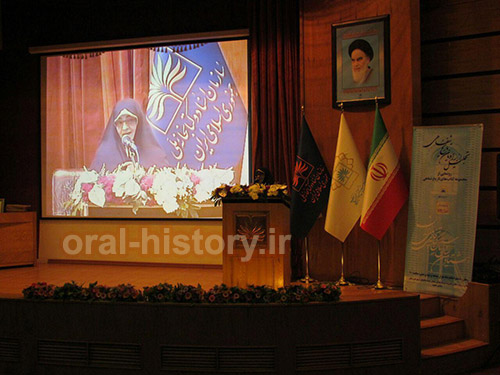
When we take a look at the existing documentations, we find that many documents and written things have untold stories which they have not been able to write and it had been necessary to use the pen and expression of owners of experience and thought. Thus, it is natural that the necessity of oral history cannot be hidden from anyone. If the friends take a look at many books compiled today, for instance memory-writing, handwritings or daily notes and so on, they can be documents for the next generations to use the social experiences and events which have been questioned and written; So, one reason for the need to address oral history is some precise and delicate points that can be the source of the impression, the source of influence, and the source of changing decisions; these are the words and sayings that the people possess and should pass them on to others.
Another point is that many personalities and individuals, who have been interviewed, did not feel that they could influence the process of shaping the history of this land and the culture of the people. They thought that they had been ignored and marginalized. The presence of some one thousand people here who have been interviewed in the form of oral history proves and their notes have been received prove my saying. Some of these people have even delivered us their documents. Another point is that if we put oral history only on the basis of the personality of the individuals, part of our oral history will be ignored again, because things happen in the society sometimes in which that individual is present in that point in time, but his or her presence does not mean that he or she has influenced in that event. Thus it is necessary to receive their opinions in order to bring about the change in the future and or we can obtain a comprehensive look from that historical approach or incident. My emphasis on these few points is that the friends know that the approach of the National Library and Archive of Islamic Republic of Iran is to pay attention to oral history, and the information and documents obtained from these individuals. In this way, it can help enrich the documents and be a source for the intellectuals who want to research and study.
The origin of influence of personalities and individuals have sometimes been ignored in the structure of the history of a land and in shaping the culture of a society and the inter-individual behaviors of the individuals all of which have been originated from the beliefs of those who can be influential. And if they are notice somehow, just some of its aspects are dealt with. Therefore, I hope that this meeting can be a horizon for those who know that they are influential but have withdrawn themselves. They have not come to narrate the history or we may have ignored them; to ask them to narrate the events, because all of them are able to be part of the cultural structure of this land. They should know their individual originality and identity and this can be a stronghold for the next generations. They should know from where they must obtain the identity and how to attain it. It is of great importance that we leave it (identity) in the society for the posterity and for their achievement to a superior status and a higher culture, because all of us believe that the culture can have the final say and should be noticed. I hope that with this approach we are able to benefit more from the presence of the oral history narrators in this meeting and the next ones.
Status of oral history in public policy-making
The next speaker was Dr. Hassan Haji Mirzaee, the Secretary of the government Cabinet. He said, "I am glad that since the announcement of the government decision, valuable moves have been carried out in the field of oral history and with the assistance of the National Library and Archives, it gradually became a method for preserving and documenting and sharing the individual's' knowledge and conception. Some do not classify oral history as knowledge because it is based on personal acquisitions of the individuals. But due to reasons, I believe that it is undoubtedly one of the most important sources of pure knowledge in the individuals' minds. We may not achieve this knowledge from another path, so oral history in some ways is a new and unique method of penetrating the minds.
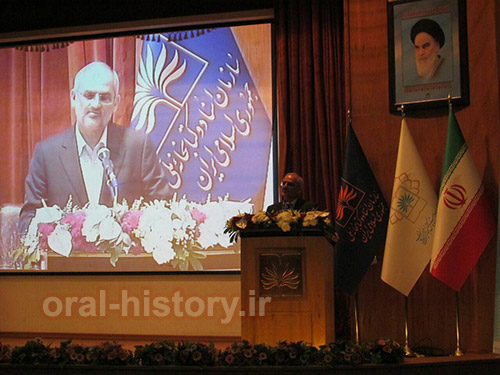
Oral history has been looked at from various angles; one is the ability to analyze the minds of humans and extract the hidden knowledge within their minds. Huge capital has been left for us in nature and humans are trying to extract them so that they can bring about great transformations in human history. The thought of humans and their underlying reserves are tremendous investments.
Public policy-making is among the most important activities of the government and this public policy-making is strongly dynamic. All of its active elements are busy compiling and developments turn public policy-making into a difficult and complicated task. The solving of a problem is in the center of policy-making and the most important subject that can be noticed from policy-making is the solving of a problem. If we think of the efficient administration of the country and securing the interests of the community, if we are after seeking to provide the necessary conditions for the continuity and survival of society, and if we want to have an effective and active encounter with the sweeping and accelerated changes that embraces all our lives, if we want to think of the efficiency and effectiveness of the government, all of these depend on the ability of a government for solving the problem in a sustainable manner. Many of the situations that governments are exposed to are problem-solving situations, and measure the amount of the government in solving the issues sustainably. For solving a problem, decoding the reason and circumstance of an event is a major and basic step. In the phenomena we study, in the subjects that we try to make a decision about them, the factor part is very important. We talk about the text and context, but more important than them are the understanding of the factor from text and the understanding of the factor from context. As long as there is no possibility of penetration into the minds of the main perpetrators of a subject, it will not be possible to understand more precisely. It is possible that the receipts of the factor and the thing formed in his or her mind and his or her reception of reality are not accurate and correct from the facts, but it is important that this perception is the source of action and to understand what a look at the phenomena has led to the decision and shaped the strategies is important. This penetration in the minds of humans is not an interview, passion and friendship, but rather a very deep research. We must have the ability to understand why and how to make decisions. If we cannot find a way to penetrate these minds and make them the capital of our decisions, it is not clear that we have many successes. For instance, this Joint Comprehensive Plan of Action (JCPOA) and the deal about which was achieved, for understanding what has happened, we received and documented the documents, reports and meetings in order to find out what has happened, but it is important to know who made this decision, what was their understanding of domestic capacities and their abilities, what was their interpretation of the outer environment and what necessities directed toward this way and what was the source of decision-making in this process. This is the purest knowledge to which today’s society needs. The problems that we face are not often pristine, and although their images and templates are constantly changing, our methods for solving many of these problems are old and lack the necessary capabilities. When a problem turns into a chronic and historic one, it shows that the necessary tools for solving this problem have not been effective. If we can open a way in this regard that the whole factors of creating important situations during various periods makes their own decisions as they think, the best path for making more precise and calculated decisions will be obtained. Many of these decisions have shortcomings because they are not exposed to such knowledge. Perhaps, this knowledge is passive for the factor and it does not mean necessarily that the factor’s mind knows it, but this is the ability of an individual equipped with oral history technique who is able to explore from within; namely it is a kind of extraction and needs precise and complicated technology in order to provide the grounds for more precise and proper decision-makings through arranging the things extracted and turning them into a knowledge. Issues like poverty, justice, employment, efficiency, and issues related to banking system are among the ones about which we have made numerous decisions and taken different policies. We used various paths with lasting success in some of them and relative success in some others, but in order to be able to properly understand and validate this past, which is our most important data for a well-informed decision, we need the people who are active in oral history. This skill must be developed extensively throughout the entire organization. We are of the opinion that that an oral history group should be along with every major project, and should constantly understand and record the phenomena that take shape and the decisions that are made and leave for others as memorial. Oral history is very different from memory-writing and individuals’ self-writings, and this requires a design to identify within the minds of humans the elements that are good for efficient and effective decision-making”.
Three effective factors in quality of oral history
The third speaker of the program was Seyed Ali Naqi (Kamal) Kharazi, the head and member of the Strategic Council of Iran’s Foreign Relations. He said, “What is important in registering oral history, is its quality and that is based on several issues. Three factors of interviewer, interviewee and subject play a major role in the quality of what is produced. Interviewer is a very important factor; that to what extent he or masters in the subject he or she wants to extract from the interviewee’s mind and should be an expert in that field and studies necessary sources in order to carry out such important task. The interviewer is not merely a tape recorder that the interviewee narrates whatever he or she wants and is recorded and eventually transcribed, but as Mr. Haji Mirzaee said, he or she should have the art to extract things from the interviewee’s mind that are not available easily, especially when political and security issues are brought up. Given the nature of these issues and the delicacies they had, the work becomes more difficult; how to extract points from the minds of the interviewee, while the interviewee can express them, or to what extent he or she has the art to extract the things the interviewee has not expressed.
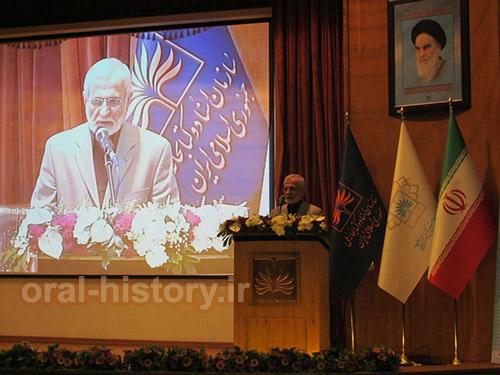
The nature of political and security issues has this complexity and the person who has been and is in these positions cannot say all of what have happened due to national interests. Thus, he or she has to shorten the meeting or to act in another way without all the mysteries of the work are specified. During the decisions made by a political and security person, there are a world of the process of data and information in his or her mind. Many issues should be reviewed while answering the questions and he or she should know what and how to say to achieve his or her goal. These have many complexities to which the oral historians should pay attention. The interviewee should be ready to express what has happened.
There may be a problem here and that is cognitive orientations with which we humans are facing. The thing we express may not be correct necessarily. It is not that we want to say incorrectly, but our brain structures and the orientation we humans are facing with may be deviated unconsciously. We humans face with many cognitive orientations. Some 180 to 185 orientations are mentioned that we are facing with. We should know how to avoid these orientations so that what we saw shall be close to reality. The essence of an interview in view of its urgency and the question you are asked and the answer you must give unexpectedly creates a problem itself. One time, you are a researcher who sits in the library and are provided with documents. You review and report them, but when a questions is asked form you unexpectedly, you do not have the opportunity to research and have to answer immediately. This urgency creates problem itself. Thus, we take hold of the available information. This creates an orientation. There is also the memory capabilities of the interviewee that to what extent he or she enjoys from higher memory and how much remembers the events definitely. Humans are different. Some have strong memory and some others weak memory; this is also a factor that can be effective in the quality of what is produced. Fortunately, a manual of style for compiling oral history has been produced in the National Library and Archives of Islamic Republic of Iran. It is a very good and complete manual of style, but it needs much training and experience so that it is transcribed exactly; many hard works have been carried out for compiling such manual of style.
At any rate, oral history apart from the value it has, can be used as a source by the researchers. It is important that we should not imagine what is provided as oral history is the reality of history. In view of the explanations I mentioned, and the problems this phenomenon is facing with, it should be valued merely as a source alongside other sources and definitive documentations which exists from a point or from a task and can explain those documents and historical facts.
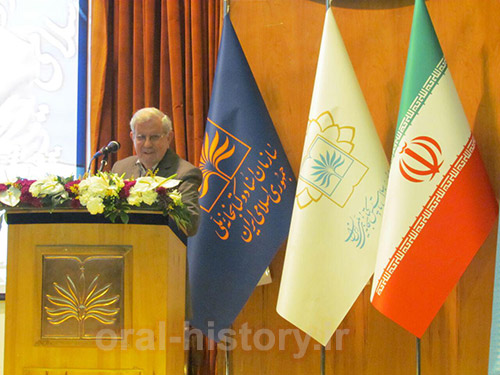
Each interview fills part of a puzzle
The next speaker of the ceremony was Dr. Seyed Hossain Shahrestani former head of the National Library and Archives of Islamic Republic of Iran. Sharestani said, " The character, dignity and endurance in the researching of such individuals as Avicenna or Abu Rayhan Birouni does not change over time, it is knowledge that changes over time, and one of these is the good practice that the National Library and Archives of Islamic Republic of Iran has undertaken. And this meeting is the product of this". Their service was to gather wholly a collection of these characters, services and even political, social, economic and cultural trends that our pioneers have created. All of these do not exist in the books, but they are in our chests. The history of our culture is like a puzzle part of which is filled through an interview with a person."
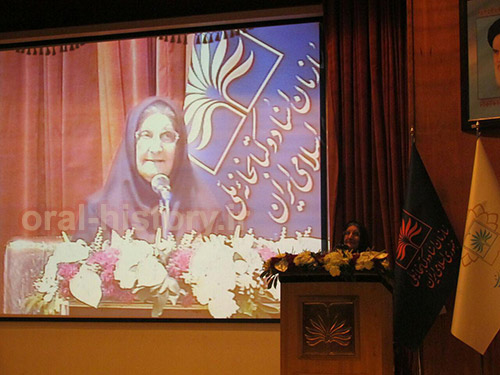
Library a base for oral history
In the ceremony for commemoration of oral history narrators, Nousharafrin Ansari said, "As a librarian and someone who does service in the Council for Children Book, I refer to a few points. In order for the oral history debate in Iran to persist and is shaped as a popular movement, the society feels that it is seen and its experiences are important and recordable, it must start from a childhood, it is late in adulthood. It is in childhood and adolescence which should be approached to the younger generation in various ways that exist in the world, and involve them in recording oral history. Start registering friends and family in order to become interested in historical documents and resources. Otherwise, generations will distance from history and fall into the trap of excitement and other events. So an important discussion is to pay attention to the mission of the library. We do not say that the library is a place to read, today librarians say it's a place for being together, talking and exchanging ideas, this is important, and we should pay attention to the institution of the library, school libraries and public libraries as an oral history database for childhood and adolescence so that we have a community in adulthood in another way.
There are instructions, but when Mrs. Salehi, a researcher at the National Library and Archives came, and I talked for hours in front of the camera for hours, this oral document was not supposed to be printed. I supposed that this document as an audio one is left in the archive of the National Library and Archives for the researchers so that can research about the authenticity of a subject or adjust it or know my view of a subject. After 15 years, Mrs. Slaehi contacted and said the organization is going to publish this work. She gave me the transcribed version of the interview which was discussed a lot, like whether the interviewee should allow his articles to pass through the editor's filter? Because it's not possible to transcribe one hundred percent. You are facing with a document the contents of which have been outdated. Mrs. Slaehi tried to lift the restriction of the previous work and create a new one somehow. The result was that she added at least 50 footnotes to the text. The efforts by Mrs. Slaehi caused the work to become documented.
Among these interviews, there is the interview of Mrs. Touran Mirhadi titled "The Victorious Legend" worked by Mrs. Rasouli as well as an interview with Mrs. Mansoureh Raee both of them are important for Iran's education system which is now in crisis."
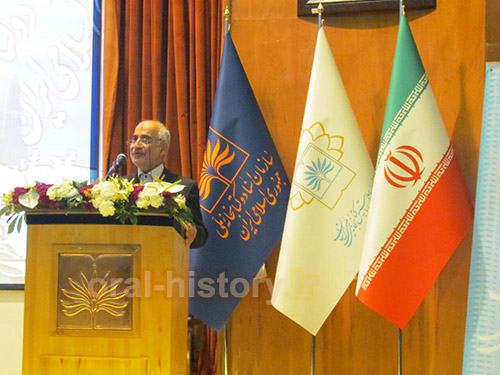
History of oral history
The next speaker was Hasan Khayat Taherdel. He said, "The persons who have conducted a thousand interviews are assets which is very good to listen to what they say, those who extract and collect the dark points of history with patience and serenity. I have talked with some of them, offering to sit in front of the interviewee for one time, because they have many experiences, because history of oral history will collect an asset. I want to defend from what has been done about oral history. It is true that history is written or interpreted by the rulers, but hearing other readings from history, even from the descendants is a very good thing that must be rewarded".
Disambiguation of oral history
The final speaker of the ceremony was Dr. Eqbal Qassemi Pouya. He said, "I said whatever I liked in my interview and this is a positive point. I am a teacher and history researcher and you know that a document is everything for a history researcher, and no document exists, there is no history and if a researcher is famous, it's because he or she has access to good documents.
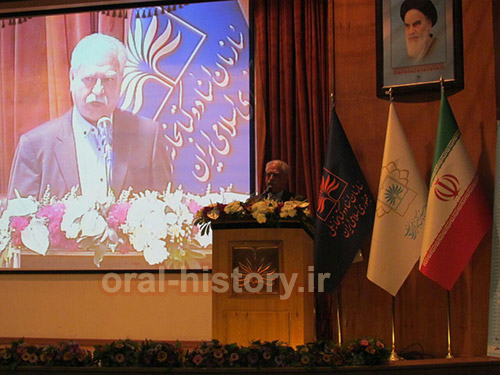
Another issue is disambiguation. Unfortunately, due to lack of documents, many researches are either format-shaped or full of ambiguities; for example, I spoke about different subjects in my interview and the rest of which depends on the history analyzer and researcher. Another instance is that it is said that the Shah wanted to pay attention to education but the people around him did not allow. I have studied the oral history of Harvard and became familiar with the articles of four professors. It is interesting that Mr. Mohammad Mashayekhi has said that when in Ramsar conference, the issue of the teachers' salary was brought up, the Shah talked and said why the teachers were not satisfied? They work 20 hours a week and are self-employed for the rest of time. So what is their problem? Someone told the Shah this was not correct, explaining the real story and this is a document."
The first ceremony for commemoration of oral history narrators was held by the Research Center of the National Library and Archives of Islamic Republic of Iran on Tuesday 27th of February 2018.
Number of Visits: 4726








The latest
Most visited
How to send Imam's announcements to Iran
In the first part, the issue of funds, Hajj Sheikh Nasrallah Khalkhali - who represented most of the religious authorities - was also the representative of Imam. In Najaf, there was a money exchange office that cooperated with the money exchange offices in Tehran. Some of the funds were exchanged through him.Operation Beit al-Moqaddas and Liberation of Khorramshahr
After Operation Fat’h al-Mobin, we traveled to Kermanshah and visited Sar-e-Pol-e-Zahab before heading to Ilam. During Operation Beit al-Moqaddas, the 27th Brigade was still receiving support from the West. We maintained contact with individuals who had previously worked in Area 7 and were now leading the brigade. It was through these connections that I learned about Operation Beit al-Moqaddas.Memoirs of Hujjat al-Islam Reza Motalebi
Hujjat al-Islam Reza Motalebi is a cleric from Isfahan. Before the revolution, he was the imam of the Fallah Mosque – which was later renamed Abuzar Mosque. By his presence and efforts, Abuzar Mosque soon became a base for supporters of the Imam and the revolution. After the victory of the revolution, he played a role in uniting forces and maintaining political vitality in southwest Tehran.The Necessity of Receiving Feedback in Oral History
Whenever we engage in a task, we naturally seek ways to evaluate our performance — to correct shortcomings and enhance strengths. Such refinement is only possible through the feedback we receive from others. Consider, for instance, a basketball player whose shots are consistently accurate; should he begin shooting blindfolded, his success rate would rapidly decline, as he would be deprived of essential feedback from each attempt.

